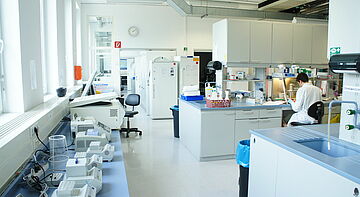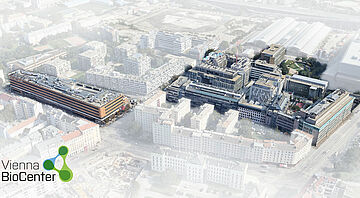IMP group leader Andrea Pauli’s research of fertilization follows two avenues: sperm-egg recognition and fusion. The work supported by the ERC Consolidator Grant will build on the ground-breaking discovery in her lab of an egg protein that is crucial factor for sperm-egg recognition in fish, and zebrafish sperm factors, which are conserved in mammals and are indispensable for fertilization in vertebrates. However, it is unclear how any of these factors function in fish or mammals, and how they work together to mediate sperm-egg binding and fusion. Moreover, additional fertility factors likely participate in mediating sperm-egg fusion and remain to be identified. To uncover the elusive mechanism of fertilization in vertebrates, the lab is planning to use both, candidate approaches with known fertility factors as entry points as well as unbiased genetic screens, combining, functional studies and in-vitro experiments. Through this, Andrea Pauli hopes to identify unknown fertility factors, work out the role of both known and novel factors in the molecular fertilization machinery, and ultimately reconstitute fertilization in vitro.
Read more on Andrea Pauli’s research here.
For the smallest units of life to function seamlessly, several intracellular activities must take place simultaneously. Complex machineries must often function without the luxury of space. This is well illustrated by the cellular protein synthesis machinery. Under cellular stress conditions, the delicate mechanism gets disrupted by “roadblocks” on the mRNA, and ribosomes translating a single mRNA molecule collide. Quality control mechanisms that rescue the so called cytosolic, or “free floating”, stalled ribosomes are well studied. However, the case of the stalled ER-bound ribosomes is more complex, and the cellular harm of such collisions is greater. Recently, GMI Group Leader Yasin Dagdas and his team were able to show that autophagy or “self-eating”, a major cellular controlled degradation pathway, is induced when ER-bound ribosomes are stalled. “Based on these findings, I postulate that autophagy selectively degrades harmful polypeptides and RNAs, molecules that obstruct the ER-bound ribosomes during collisions,” states Dagdas. As a result, the stalled ER-bound ribosomes are rescued by this conserved cellular quality control mechanism. With his ERC funding, Yasin Dagdas’s approach will allow to comprehensively dissect this cellular phenomenon using model plants and human cell cultures. Dagdas concludes: “This work aims to fill a fundamental gap in our understanding of ribosome-associated quality control mechanisms.”
Get to know Yasin Dagdas and his research in this interview.
The European Research Council (ERC) is a highly prestigious funding body of the European Union. The ERC’s mission is to facilitate the highest quality of research across all fields in Europe through competitive funding. The projects may be headed by starting or established researchers, and the sole criterion for selection is scientific excellence.




